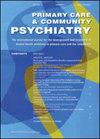The prevalence and associations of unexplained chronic fatigue in Brazilian primary care
引用次数: 5
Abstract
Background: Unexplained chronic fatigue (UCF) and chronic fatigue syndrome (CFS) have been reported to be associated with female gender, older age, lower socioeconomic status and psychiatric disorders by previous studies, mostly conducted in Western developed countries. To date, there have been very few studies of UCF/CFS in Brazil. Aim: We examined the prevalence and associations of UCF in Brazilian primary care. The main question was whether the profile of risk factors for UCF in Brazil is similar to that reported in Western developed countries. Methods: A cross-sectional survey was conducted at two general practices in Sao Paulo. 304 consecutive attenders, aged 18-45 years, completed questionnaires on fatigue, psychological distress and socio- demographic characteristics. Those with substantial fatigue lasting 6 months or more were interviewed to ascertain the presence of CFS and psychiatric disorders. Patients suffering from substantial fatigue for 6 months or more with no medical explanation and no psychiatric exclusion diagnoses for CFS were classified as cases of UCF. Results: The prevalence of UCF and CFS was respectively 10.9% and 1.3%. Psychological distress was significantly correlated with fatigue. Older age, female gender and higher education level were independent risk factors for UCF. Conclusion: The prevalence of UCF and CFS in Brazilian primary care was comparable to that reported by the previous studies in Western affluent countries. However, while age and gender followed the previously observed pattern of association, an opposite pattern was found regarding education. Possible reasons for this unusual finding were discussed.巴西初级保健中不明原因慢性疲劳的患病率及其相关性
背景:以往的研究报道了不明原因慢性疲劳(UCF)和慢性疲劳综合征(CFS)与女性、年龄较大、社会经济地位较低和精神疾病有关,这些研究大多在西方发达国家进行。迄今为止,巴西对UCF/CFS的研究很少。目的:我们研究了UCF在巴西初级保健中的患病率及其相关性。主要的问题是,巴西的UCF风险因素是否与西方发达国家的报告相似。方法:采用横断面调查方法,对圣保罗两家全科医院304名18-45岁的连续就诊患者进行疲劳、心理困扰和社会人口学特征问卷调查。对持续6个月或更长时间的严重疲劳患者进行访谈,以确定是否存在慢性疲劳综合症和精神疾病。患者出现持续6个月或更长时间的严重疲劳,没有医学解释,也没有精神病学排除CFS的诊断,被归类为UCF病例。结果:UCF和CFS患病率分别为10.9%和1.3%。心理困扰与疲劳显著相关。年龄较大、女性性别、高学历是UCF的独立危险因素。结论:巴西初级保健的UCF和CFS患病率与西方富裕国家先前的研究报告相当。然而,虽然年龄和性别遵循先前观察到的关联模式,但在教育方面却发现了相反的模式。讨论了这一不寻常发现的可能原因。
本文章由计算机程序翻译,如有差异,请以英文原文为准。
求助全文
约1分钟内获得全文
求助全文

 求助内容:
求助内容: 应助结果提醒方式:
应助结果提醒方式:


